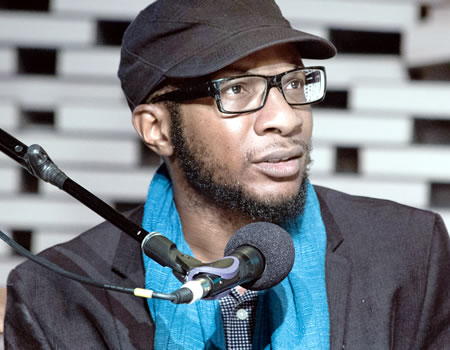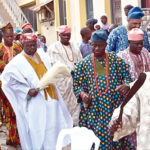
SINCE the inception of humanity, art has always been a medium of expression. It has not only shaped human history but also has the tendency to influence the present and the future. Yet, only few practitioners of art seem to explore all its genres and potential.
Here, Teju Cole stands out. He is an art historian, art critic, photographer, music curator, journalist, writer, and recently a Harvard University professor.
Born in 1975 in Kalamazoo, Michigan, United States, by two Nigerian parents, Cole is the oldest of four children. Teju Cole returned to Lagos, Nigeria, with his mother shortly after his birth. His father joined them in Nigeria after completing his MBA from Western Michigan University.
ALSO READ: EFCC to arraign 4 police officers for allegedly stealing N1.3bn
When Cole was 17, he went back to the United States for his university education and graduated from Kalamazoo College in 1996. After dropping out of University of Michigan Medical School, he studied art history from the School of Oriental and African Studies (SOAS), University of London, and graduated with an Master or Arts in 2000. He then proceeded to the Columbia University in New York where he obtained a doctorate in art history in 2006.
Cole’s sense of history is deep and, to some extent, personal. Growing up in Nigeria in a middle-class family, he was curious about his immediate world.
In his Art Basel article titled ‘A Defense of Art in Troubled Times’, Teju Cole observed that his most notable peculiarity is a certain intense attitude to history that had engulfed him since he was 10.
“I saw history’s disasters, and wondered when they would touch me directly. Part of this was a longing for extremes; a wish we sometimes have to see everything upturned,” he admitted.
By the time he left Nigeria for the United States in 1992, he wished that things would steadily improve. However, they seldom did.
“My sense of doom was still there, but less intense than it had been in more volatile Nigeria,” he added.
Then, years later, the disaster came. But it was neither as he had imagined it to be in his childhood days nor did it affect him directly.
“The disaster was the dismantling of norms, the mainstreaming of vicious prejudice, the unmasking of aggression, reiteration of racism, the re-litigation of homophobia, the escalation of misogyny—the old problems, but now magephoned,” he lamented.
There is no doubt that Cole’s deep sense of history and the human condition is resplendent in his work. Liquid Music Blog contributor, Patrick Marschke, in a recent interview with Cole observed that his work seems not to pay much attention to genre hierarchy or classification.
Marschke asked, “How have you sustained such broad interests and output when it is so easy to be pegged solely as a critic, writer, photographer, etc.?”
“Categorisation can really be tedious; but when you find a space that is responding to something other than the needs for exigencies of the market place, it is a real pleasure because then something else can happen,” Cole replied. “In every situation, you should try to maximise your creative freedom.”
As a renowned photographer and a photography critic, Cole owns a monthly column in the New York Times Magazine, ‘On Photography’, which was a finalist for the 2016 National Magazine Award. There have been solo exhibitions of his photography in Italy, Iceland, India, Germany, Switzerland, and the United States.
His recent publication, Blind Spot (2017), a book of photography and text, which he produced in collaboration with Vijay Iyer, was named one of the best books of 2017 by Times Magazine.
“It’s a very advanced form of real-time composition,” Cole said about ‘Blind Spot’. “For me, just to be working with somebody who is so advanced in his thinking, and yet also creates such beautiful work is such a thrill.”
Cole’s colossal love for art extends beyond the milieus of history and literature. Though not a performing musician, his interest in music has further bolstered his fame. As a prolific creator of Spotify playlists, Teju Cole has always been interested in presenting the music in his head to other people.
“I’m not paid for it. It’s not part of my job description. It just gives me a lot of joy, and I think it gives other people joy as well,” he said about his work as a creator of playlists.
“There is no hierarchy among genres—the list includes a lot of so-called jazz, hip-hop, classical, Nigerian dance music, a lot of so-called world music because all of it is interesting.”
Cole’s writings do not only reflect artistic prowess but they are also resplendent in pressing societal issues. His four books cut across virtually all literary genres. They include: Every Day is for the Thief (2007), a novella; Open City (2012), a novel; Known and Strange Things (2016), a collection of more than 40 stories; and Blind Spot, (2017), a photo book.
With these internationally acclaimed books, it seems Teju Cole is just warming up. He is currently working on Radio Lagos, a nonfictional narrative of a contemporary Lagos.
With Cole’s vivacious love for the visual and mastery of writing, the British-Indian novelist and essayist, Salman Rushdie, described him as “among the most gifted writers of his generation.”
Interestingly, Cole’s books did not only attain global readership but they also received rave reviews from top international book reviewers like the New York Review of Books, Financial Times, Los Angeles Times, the San Francisco Chronicle, the Guardian, among others.
Teju Cole has amassed many literary prizes, awards and fellowships, including PEN/Hemingway Award, the Windham Campbell Prize, National Book Critics Award, International Literature Award, New York Public Library Young Lion Award, among others.
He was also shortlisted for the 2017 Aperture/Paris Photobook Award, PEN/Open Book Award, and the Rosenthal Award for the American of Arts and Letters, among others.
Teju Cole was a 2018 Guggerheim Fellow, a Distinguished Writer in Residence at Bard College, a 2014 writer in residence of the Literaturhaus Zurich and the PWG Foundation Zurich.
Cole has delivered many lectures in many universities including, but not limited to, Duke, Indiana, and Amsterdam. In the spring of 2019, he will be delivering the Randy L. and Melvin R. Berlin Family Lectures at the University of Chicago.
Teju Cole is also active in journalism and social commentary. He is a regular contributor of the New York Times, Quarrtsiluni, Granta, the New Yorker, Transition magazine, the New Inquiry and A Public Space.
In an interview withpoet Adam Fitzgerald, where Cole spoke about life beyond politics and the beauty of art, Fitzgerald observed that what is immediately striking about Cole’s collection of essays, “Known and Strange Things”, is the fluency in traditions and identities that both belongs and does not belong to him. Then, Fitzgerald asked him how he managed to layer those selves and histories as a writer.
Cole, who has been severely criticised for his socio-political views and commentaries, replied, “I get different things from being an American, from being a Nigerian, from being a Yoruba.For example, there are forms of argument present in theAnglo-American legal tradition that are more helpful to me than traditional Yoruba jurisprudence… Being here helps me to understand that I’m African in specific ways that are invaluable to me. But it also helps me understand that I’m an American in a way that I’m eager to preserve.”
When Fitzgerald asked, “Can artwork be removed from the cultural forms of oppression it’s linked to?”
Cole’s answer was direct and simple. “Let me make my own personal augment in defence of making art… There is this idea that we do war so that our children will do commerce, so that their children will be poets… I’m not doing war, and I’m not going to waste my life with commerce,” he answered. “I want my goal of civilisation to be as follows: to do the work, to pay attention to what’s beautiful, to encourage others in that form of attention as well. Deferring one’s pleasure because of other people’s anxieties seems kind of weird to me.”
As an art critic, Teju Cole has published a lot of scholarly work. His work has been researched and worked on by many critic and academic as well. His expertise in art and literature is well-sought after by scholars and academic.
Cole, with his exceptional genius, has proven the veracity of one of P. T. Barnum’s motivational quotes: “The noblest art is that of making others happy.”
With his extraordinary achievement as an acclaimed historian, international photographer, famous music curator, active journalist, awarding-winning writer, erudite scholar, and a Harvard professor, Teju Cole has indeed proved that it is possible to be a Jack of all trades, master of all.
Kingsley Alumona is with the Nigerian Tribune





